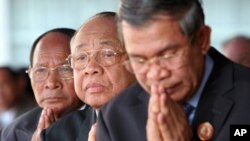WASHINGTON DC - Prime Minister Hun Sen has approved a new inspectorate office for the judicial system that critics say is unnecessary and potentially harmful.
The 16-member agency, called the Inspection Office of the Supreme Council of Magistracy, was initiated by Supreme Court chief Dith Munthy and Cabinet Minister Sok An, according to government officials and media reports.
It would increase the influence of Sok An, who is also a Deputy Prime Minister and already the co-chairman of the Council for Legal and Judicial Reform, over the Supreme Council of Magistracy, which is an independent oversight body.
Analysts say the new office does not improve government oversight, is lacking laws under which it can work and is not independent from the executive branch of the government. This leaves it open to manipulation, while the courts themselves remain politically biased and susceptible to bribery.
“It affects the independence principle of the court and the division of the power stipulated in the constitution,” independent analyst Lao Monghay told VOA Khmer. The new agency allows for arbitrary punishments of judicial officials, he said, rather than set out statutes for the punishment of corrupt judges, prosecutors and others.
Supporters say it will speed up judicial reform. But opponents say it won’t serve the public.
Son Chhay, opposition lawmaker for the Sam Rainsy Party, said the new body has the power to serve some members of the ruling Cambodian People’s Party without checks or balances.
“And this will cause more serious corruption,” he said. The government would do better to strengthen the Supreme Council of Magistracy, which is constitutionally charged with overseeing the judicial branch of government, he said.
Justice Ministry officials could not be reached for comment.
However, Suy Mongleang, secretary-general of the Council for Legal and Judicial Reform, said the institution was created to make it easier to take action against corruption and “to give the court a [good] reputation.” The council will handle investigation and complaints and resolve problems at court, he said.
Suon Bunsak, chief secretary for the Cambodian Human Rights Action Committee, welcomed government initiatives to reform the judiciary. But he too said the Supreme Council of Magistracy should be the entity to police the judicial system.
Judicial Inspectorate Not Expected To Be Effective
- Sok Khemara
- VOA Khmer

Supporters say it will speed up judicial reform, but opponents say it won’t serve the public.






